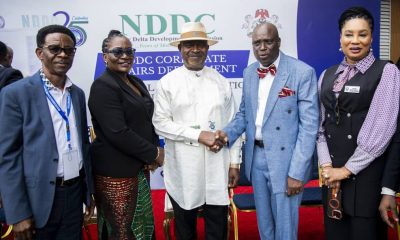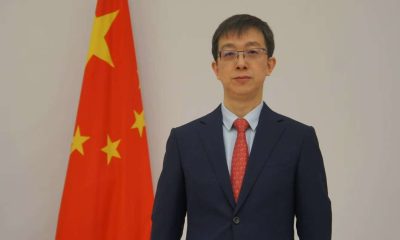NEWSXTRA
Hensard University, Bayelsa LGA Commission Sharpen Workers’ Agro-Investment Skills To Boost Revenue, Sustain Development

Heads of departments and staff from the agricultural sectors of Bayelsa State’s G8 and G32 Local Government Areas (LGAs) recently concluded a comprehensive two-day training workshop focused on agro-based ventures.
Organised by the Local Government Service Commission in collaboration with Hensard University, the initiative aimed to equip participants with the knowledge and skills necessary to harness the agricultural potential within their respective LGAs.
Declaring open the training, Chairman of the Commission, Chief Lambert Ototo and his array of Commissioners, emphasised the goal was to improve agro skills of the workers and the Internally Generated Revenue (IGR) as well as foster sustainable economic development.
Held on July 17th and 18th, 2025, at Jerry Century Place in Yenagoa, the workshop centered on the theme “Agricultural Innovation for Sustainable Economic Growth.” The intensive program featured a series of presentations and interactive sessions led by experts in agribusiness, finance, and local governance.
Mr. Amos Kester Ebiowe officially opened the training, emphasising the crucial role of agro-based ventures in driving local economic development. He underscored the need for innovative approaches to transform the region’s abundant agricultural resources into viable revenue streams.
The workshop agenda covered a wide range of relevant topics. Mr. Caleb Joseph-Osio delved into “Agro-Investment Models for Local Governments: From Farm to Revenue,” providing practical frameworks for LGAs to structure their agricultural investments.
A key highlight was the presentation by Mr. Matthew Augustine, who elucidated “Value Chain Analysis in Agriculture: Identifying Entry Points for Local Governments.”
Augustine explained that value chain analysis is a strategic framework that helps agro-venture businesses identify and evaluate all activities involved in creating an agricultural product, from production to delivery to the final consumer.
He provided a detailed breakdown of major agricultural value chains relevant to Bayelsa State, including plantain, cassava, yam, groundnuts, poultry, and fisheries.
Focusing on plantain, Augustine showcased how value could be added at each stage – from cultivation and post-harvest handling to marketing, processing (into flour, chips, or frozen products), and even utilising waste from the bunch for fabrics and disposable packaging.
Associate Prof. Unekwu Onuche addressed the critical issue of “IGR Development through Agro Ventures: Strategic Planning and Revenue Forecasting.”
He highlighted the complex interplay between poverty and finance in Bayelsa, noting that despite substantial funds being available, their impact was not adequately felt by the populace.
Onuche revealed startling statistics: a per capita income of just 820 USD (approximately N3594.5/day), with 46% of the population living below the extreme poverty line (2.15 USD/day), and a multidimensional poverty rate of 63%.
He argued that by harnessing the state’s vast agricultural resources, particularly its extensive water bodies, LGAs could significantly boost IGR, alleviate poverty, and improve overall living standards.
Dr. Neebani Emmanuel, expert on agro-based investment, provided a roadmap, “From Strategy to Execution: Designing Agro-Based Investment Projects at the LGA Level,” and explored “Public-Private Partnerships (PPPs) and Collaborative Models for Agro Investment.”
He presented a comprehensive framework for designing and implementing agro-based investment projects, emphasising the need for a structured, community-driven, and business-oriented approach.
Dr. Emmanuel explained that “Bayelsa State has over 70% of its landmass consisting of wetlands and freshwater swamps. The state enjoys abundant rainfall, a humid tropical climate, and fertile alluvial soils, giving it significant agricultural potential that remains largely underutilised.”
He also focused on non-conventional agro-enterprises like snail farming (heliculture), grasscutter rearing, and mushroom cultivation, citing their low startup costs and adaptability to Bayelsa’s coastal terrain as viable pathways for rural job creation, income generation, and improved food security.
Dr. Emmanuel also addressed the issue of abandoned agro projects in Bayelsa State, citing the “Bayelsa Back to Farm” program, the Bayelsa Rice Farming Initiative, the Coastal Fishery Development Project, the NDDC Cassava Processing Plant (Yenagoa), the LG Coconut Plantation (Brass), and the Bayelsa Agro-Tech Youth Training Scheme as examples of projects that have failed to deliver on their intended goals.
He warned of the economic consequences of such failures, including food scarcity, youth unemployment, and continued reliance on imports.
The Vice Chancellor of Hensard University, Prof. Dileep Kumar M, delivered a goodwill message, commending the Local Government Service Commission and Hensard University for their collaborative effort in organising the training program.
He expressed confidence that the initiative would equip participants with the knowledge and skills to drive economic development and enhance IGR at the local government level.
The workshop culminated in the presentation of certificates to all participants, signifying their successful completion of the training.
The participants expressed optimism that the insights gained during the workshop would enable them to develop and implement effective agro-based investment strategies within their respective LGAs, contributing to a more sustainable and prosperous future for Bayelsa State.
The training is expected to foster a renewed focus on agriculture as a key driver of economic growth and diversification in the region, moving away from its over-reliance on crude oil.
-
CRIME4 years ago
PSC Dismisses DCP Abba Kyari, To Be Prosecuted Over Alleged $1.1m Fraud
-
FEATURED4 years ago
2022 Will Brighten Possibility Of Osinbajo Presidency, Says TPP
-
FEATURED2 years ago
Buhari’s Ministers, CEOs Should Be Held Accountable Along With Emefiele, Says Timi Frank
-
BUSINESS & ECONOMY2 years ago
Oyedemi Reigns As 2023’s Real Estate Humanitarian Of The Year
-
SPORTS2 years ago
BREAKING: Jürgen Klopp Quits Liverpool As Manager At End Of Season
-
SPORTS2 years ago
Could Liverpool Afford Kylian Mbappe For €200 million? Wages, Transfer Fee
-
ENTERTAINMENT2 years ago
Veteran Nigerian Musician, Basil Akalonu Dies At 72
-
FEATURED2 years ago
Tribunal Judgement: Peter Obi Warns Of Vanishing Electoral Jurisprudence, Heads To Supreme Court
-
BUSINESS & ECONOMY2 years ago
Oyedemi Bags ‘Next Bulls Award’ As BusinessDay Celebrates Top 25 CEOs/ Business Leaders
-
FEATURED4 years ago
2023 Presidency: South East PDP Aspirants Unite, Demand Party Ticket For Zone



































